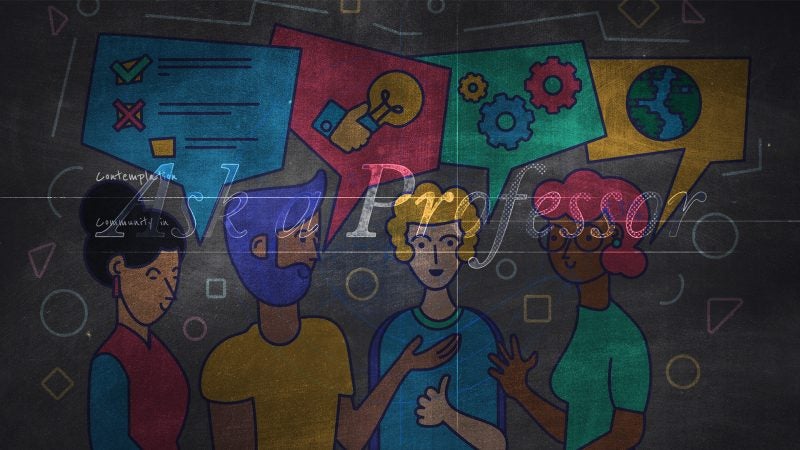Why is civil discourse important?
Civil discourse matters because if we actually want to accomplish a goal, it will likely require some degree of compromise. At least it requires maintaining a conversation. But perhaps more importantly, civil discourse matters because no matter our disagreements, we can’t fall into that pattern of taking othering to the extreme of dehumanization. The consequences are severe and irrevocable.
How has civil discourse changed over the years?
I can’t speak to the history of civil discourse, but we all know that an important change over the last few decades involves the medium in which we choose to engage. The world has been changing so fast in terms of the options that people have for interacting with others. We can interact via in-person conversation, phone calls, video calls, text messages or social media, and some of these options are still quite new. People quickly develop interactional norms for new modes of communication, but I’m not sure that we’ve always had time to develop and reflect on the norms that we want, that will promote civil discourse.
What mindset should people adopt when going into polarizing conversations?
The mindset we should go in with, again, is curiosity, because this will enable you to engage someone with questions about the thoughts they’ve shared or the opinions they hold. Having conducted hundreds of research interviews on all sorts of topics, some more deeply polarized than others, I know that it takes practice. But imagine that your job is to understand this person you’re interacting with, to understand how they think. It’s always helpful to take a little pause, a little breath, to remind yourself to draw someone out and listen to them. Asking a question like, ‘It sounds like this is important to you, can you tell me more about it?’ or ‘What appeals to you about [this candidate, this policy]?’ or even just expressing interest can encourage someone to elaborate.
Is agreeing to disagree a useful way to maintain a positive discourse?
Think about a time when you’ve said or heard, ‘Let’s agree to disagree.’ Chances are that when this phrase was used, it sent a signal that said something like, ‘We’re done talking about this.’ It ends the discussion, it closes the topic.
Maybe it’s sometimes necessary to close a topic, but I don’t think agreeing to disagree actually means that there has been an agreement to disagree and that now we respect and celebrate each other. So I think the challenge is to reopen that conversation later: we’ve agreed to disagree for now, but can we still talk about this topic in the future?
What sort of body language can we use in contentious conversations?
Active listening matters. Linguists talk about backchanneling, which includes paralinguistic cues like nods, moving our eyebrows up and down, or those ‘uh huhs,’ ‘mm-hmms,’ and ‘ohs’ and that kind of thing. What backchanneling does is help regulate the turn-taking system of an interaction. So if I’m speaking and I hear you say, ‘uh huh,’ I interpret that backchannel as you signaling, ‘I’m listening, I’m with you, and I’m not taking a turn. You keep talking.’
How much does curiosity rely on assuming the goodwill of other people?
I can understand how hard it can be sometimes to show curiosity, especially on challenging topics where people deeply disagree. But we can try to remember that people come to an interaction with so much life experience — the people they talk to, the media they consume, the way they grew up, all the beliefs they’ve built over the years. All of this informs how they understand a situation.
So we can assume the goodwill of other people if we acknowledge that, just like us, people are coming to a situation with all of their experiences behind them. We can start there. And people usually love to be listened to, so we might even create some goodwill by engaging in this way.
What do you do if someone does not want to engage in a constructive conversation?
You can only control what you do. If someone doesn’t want to engage in a constructive conversation, you can’t force them. But you never know — I think if you try to do your best and live by your values, I don’t know you’ll regret that because you’ll have done what you could. Someone might have just walked away from you, but perhaps you made an impression that will stay with them even if they weren’t willing to engage today.
How do we promote a culture of curiosity in our society?
Each of us can make the decision to try to promote curiosity in our own behavior. Curiosity is a muscle we can strengthen. For example, if you look at the media you consume — mass media, legacy media, social media, all of it — what does it look like? Can you break out of your patterns? What if you watched a show or listened to a podcast that you might find completely at odds with your worldview? I personally like to do that because engaging with these ideas helps me clarify what I actually believe, and exposes my doubts so that I can do further thinking to address them.
But ultimately, civil discourse is difficult. I tend not to believe in magic words, and certainly no one, not even a linguist, can promise you that if you say this one thing your conversation will go well, no one will be mad at you, and all your relationships will remain intact. The best we can do is to engage others with civility in mind, moment by moment.




